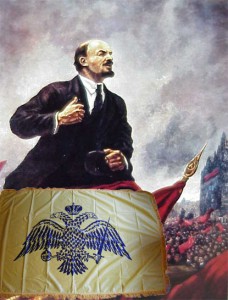Did the Byzantine Empire Fall in 1991?
 Drew asks if we can consider the Soviet Empire as a continuation of Byzantium. It’s well known that Moscow at one time considered itself as the ‘third Rome’ (or second Constantinople). There were some compelling reasons to think this. Moscow was originally built on seven hills like Rome and Constantinople, Russian troops had been serving in the Byzantine army since the 10th century, and the Russian alphabet, Orthodoxy, and (to some degree) culture had been provided by Byzantium. When Ivan III married Sophia Paleologus- the niece of the last Byzantine emperor- he had a strong claim to be the legitimate heir to the Roman Empire.
Drew asks if we can consider the Soviet Empire as a continuation of Byzantium. It’s well known that Moscow at one time considered itself as the ‘third Rome’ (or second Constantinople). There were some compelling reasons to think this. Moscow was originally built on seven hills like Rome and Constantinople, Russian troops had been serving in the Byzantine army since the 10th century, and the Russian alphabet, Orthodoxy, and (to some degree) culture had been provided by Byzantium. When Ivan III married Sophia Paleologus- the niece of the last Byzantine emperor- he had a strong claim to be the legitimate heir to the Roman Empire.
Setting aside Ivan for a moment, we can dismiss the Soviet Empire entirely. It was a reaction against the very institutions which drew their inspiration from Byzantium. It replaced Orthodoxy with its own saints- Marx, Lenin, Stalin, etc- and did away with the traditional and political underpinnings of the Tsardom.
A better case can be made that the Russian Revolution of 1917 ended Byzantium, but there are still some serious problems with this. For all of the similarities the Russian Empire was a unique entity. They added their own influences into the mix and ultimately drew their inspiration from the Slavic world not the Greek one. More importantly, they didn’t think of themselves as a continuation so much as use imperial Byzantine symbols to legitimize their own rule. Ivan wrapped himself in the double eagle because it added to his prestige, not because he thought of himself as a new Constantine. He was more interested in keeping Ivan alive (and in power) than in resuscitating Byzantium. Constantinople was only important so far as it aided that goal.
A case in point is the 2009 Russian video “Death of an Empire: the Byzantine Lesson” which is narrated by Vladimir Putin’s father-confessor. (you can watch the entire thing on youtube) The film draws a parallel between Byzantium and Russia and the message is that the West is not to be trusted. The Byzantine Empire is pressed into service as a surrogate Russia, and its fall is a warning not to fall into the debt of the West. But the narrator’s call is not to restore Byzantium, it is to restore the Orthodox Russian Empire; an entity not a successor.